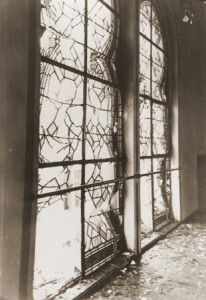Kristallnacht in Poetry & Prose

“Kristallnacht, literally, “Night of Crystal,” is often referred to as the “Night of Broken Glass.” The name refers to the wave of violent anti-Jewish pogroms which took place on November 9 and 10, 1938, throughout Germany, annexed Austria, and in areas of the Sudetenland in Czechoslovakia recently occupied by German troops.”
“Kristallnacht figures as an essential turning point in Nazi Germany’s persecution of Jews, which culminated in the attempt to annihilate the European Jews.”
Both of my paternal grandparents had arrived safely in the United States before the Kristallnacht of November 1938. And yet, among the stories my grandmother told over the years, the tale of how her parents and other loved ones back in Germany experienced the horrific events lodged in my mind and in my heart.
There were two aspects of these stories that lingered with me in particular. First, there was what she reported had happened to her parents—my great-grandparents—who were still living in Germany. Then, there was the fate of Grandma’s favorite uncle, Michael, who was–like so many other Jewish men at the time–deported to Dachau.
Perhaps it isn’t surprising, then, that Kristallnacht appears several times in my work. It shows up in poems: “Mannheim” and “Pünktlichkeit.” And in stories, including some of the stories in Quiet Americans.
In “For Services Rendered”:
“But after November 9th—after nine of Berlin’s twelve synagogues were torched and children from the Jewish orphanages made homeless and more than one thousand Jewish men sent away from the city—well, so much had changed.”
In “Homecomings”:
“‘Those men came in,’ her mother had said, once they could speak freely about that night back in November 1938. ‘They smashed the windows. The china. The paintings.’ Much worse, indescribably worse, was the way they had smashed her father, too. Before, even, sending him to Dachau.”
In real-life family history, my great-grandfather was not sent to Dachau. (The circumstances of how he survived the war and ultimately died in 1946 I have dramatized in my unpublished novel, snippets of which are available here and here).
But, as the Dachau Concentration Camp Records confirm, that favorite uncle arrived at the camp on November 11, 1938, and he died there on December 3. His death hit my grandmother hard.
Somehow, as I was writing my stories, I found a way to memorialize him.
I wrote the first draft of “Lebensraum“ during my first semester in an MFA program, in the fall of 2001. For Hanukkah that year–I didn’t know that it would be my grandmother’s last one, I mailed her a large-copy version of the draft.
She called me immediately after she read it. “You’ve been listening to me!” she said. And I had. For the story is grounded in the circumstances of my grandparents’ early married life, when my grandfather was drafted into the U.S. Army.
But there’s one big difference, and my grandmother spotted it immediately.
“You named the baby after Uncle Michael!”
Yes. Again, unlike “real-life” history—where a disagreement had prevented my grandparents from naming their son (my dad) after my grandmother’s uncle—the infant born in “Lebensraum” to German-Jewish refugee parents IS given the name of someone beloved who “died of Dachau.” This character—Michael, nicknamed “Mickey”—embodies one small way that I remember Kristallnacht–and everything that it signifies.
Hi Erika,
Thanks a lot for the notification
An informative piece.
great reminiscences of the past.
Though your grandparents stories
are so horrifying it indeed help you
to weave wonderful stories and poems!!
Great Going
Keep inform
Phil
Your personal, moving touch brings Kristallnacht closer to your readers.
Thank you so much for the comments.